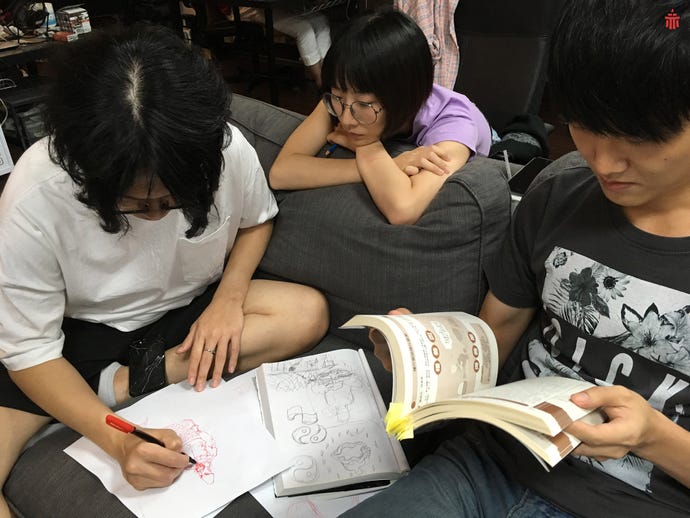Red Candle Games Looks Back on Devotion, And The Controversy That Shook a Region
How the studio is committing to making even more games that push creative boundaries even after Devotion's yank from Steam.
This article first appeared on USgamer, a partner publication of VG247. Some content, such as this article, has been migrated to VG247 for posterity after USgamer's closure - but it has not been edited or further vetted by the VG247 team.
"That floor! That floor! This is the type of floor many Taiwanese households have!" exclaimed Taiwanese YouTuber Kouki as he streamed Devotion, the psychological horror game by Taipei-based developer Red Candle Games, in February 2019.
Kouki's reaction isn't an anomaly, especially among players of Chinese descent like myself; the very notion of seeing cultural nuggets like these reflected on screen—from the marble floor as pointed out by him, to the traditional paper calendar hung in Devotion's Taiwanese apartment—is a rarity in games. With its masterful and tragic portrait of a family mired in superstition and blind faith, Devotion eventually exploded in popularity across the globe. This was especially the case in China, where Devotion was at point the most watched title on Bilibili—one of the nation's top video streaming websites.
Yet all this came to a startling halt when eagle-eyed players spotted a caustic put-down of the Chinese President Xi Jinping disguised within the seals of the game's paper talismans. The Chinese government moved quickly: Devotion was taken down from Steam on February 23, just days after its release. Its Chinese publisher, Indievent, swiftly had its business license revoked. After being battered by a storm of harsh criticism, Red Candle Games soon suspended the sale of Devotion indefinitely.
Reflecting on the incident, the team admits this dealt a painful blow to the studio. "There was a time when we were all low in morale. After all, it is a project that we've put our heart and soul into for more than two years. None of us would want to see it happen like this," shares Doy Chiang, the co-founder of Red Candle Games.
More than just vitriolic hatred hurled at them from many mainland Chinese players: rampant disinformation and rumors also spiraled in the aftermath. Much speculation centered on references to a man named "Baozi" within the game's newspaper clippings, who had been sentenced to death for an unnamed offense. Some players saw this as a slight against Xi given that "Baozi," which means steamed bun in Mandarin, is another common barb used to mock the Chinese president. This was later proven to be erroneous, with that being a nickname for one of the studio's co-founders, Henry Wang.
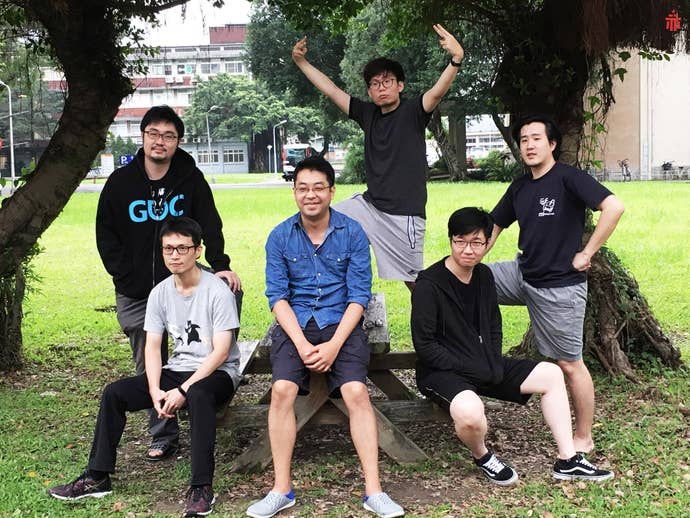
As with most controversies, this tumultuous period would have been a harrowing experience for any developer—even one that could threaten closure for the studio. Chiang mentions the studio was fortunate to emerge from the ordeal largely intact, and expresses surprise at the far-reaching impact on the incident. "It has also given us the opportunity to reflect on the influence of our games toward the global community," Chiang says.
Even amid the virulent reaction, there was a significant outpouring of support from parts of the gaming community, which Chiang said helped tide the studio through its worst days. Seeing the hashtag #support_redcandle, coined in support of the studio, gave the group new impetus to keep trudging through. "Many of these hashtags were filled with heartwarming messages, encouraging words and beautiful fanarts," Vincent Yang, another co-founder of Red Candle Games, adds. "To tell the truth, the love we received from our community really helped us lift our spirit during the hardest time. For that, we are all in debt to our supporters worldwide."
Unlike Red Candle's first game, Detention, which details the horrors of living under Taiwanese martial law in the 1980s, Devotion was never supposed to be an expression of any overt political statement; it was largely a domestic tale about religious fanaticism. So in light of the backlash over Devotion, it would be difficult to fault Red Candle Games if it planned to steer clear from controversial topics such as politics in its future games. When posing this question to the co-founders, however, they're adamant that this won't be the case for the studio.
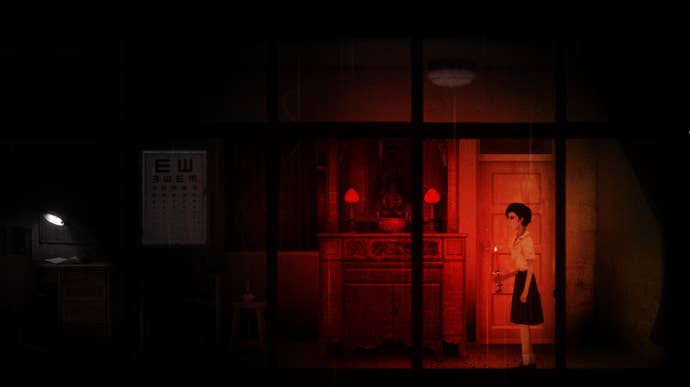
"As game developers, we won't set limitations to our creativity, but at the same time, we don't want to be defined as the team who is only capable of making a certain genre of games," Chiang says. "From the establishment of the studio till now, we have been constantly exploring different themes and playing experiences. Rather than build our games around current social topics, we were often inspired and led by great contents. In that sense, we won't shy away from any subjects as long as we [feel] that the underlying story/message is worth sharing."
It's also why the studio's upcoming game, which is still in the early stages of development, isn't going to resemble its previous titles. One key difference is that it definitely won't be a horror game. "[I]n general, we took a different approach this time around, trying something new with the prototypes. It would not be a horror game, and won't focus much on real history, but definitely would embed a lot of elements that's related to Eastern cultures, religions, and artworks," Yang shares.
Rather than any particular fixation or love for the genre, horror was a narrative choice used to introduce international players to the Taiwanese culture and folklore. As Yang explains, the genre allows the team to aptly leverage the audience's lack of knowledge around the subject, which can be used to deliver an enduring horror experience.
"From the very beginning, one of our goals was to attract foreign players to experience our games. And our attempt to achieve that was to combine both Taiwanese elements and horror. Making the game scary by utilizing people's fear towards unknown culture and objects, we figured it may help our contents to stand out from most other games in the market," says Yang.
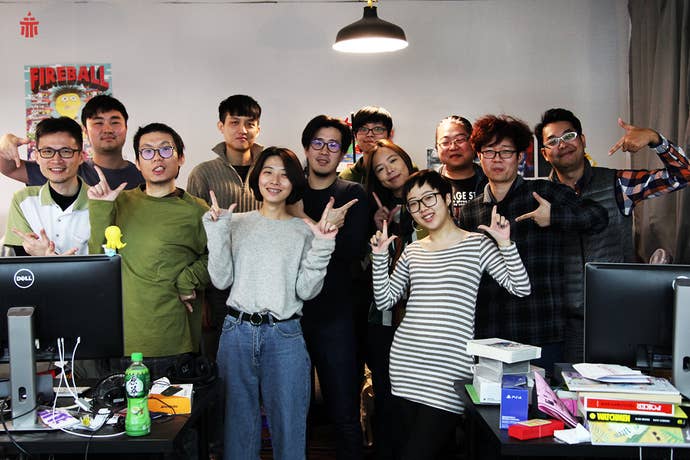
This emphasis on sharing facets of East Asian culture with the rest of the world was what drew the team together in the first place. While working on Detention independently, Coffee Yao, one of the six co-founders behind Red Candle Games, met Wang at a gathering for local indie game developers. Wang was immensely drawn to the game's historical Taiwanese elements, and quickly agreed to aid in the game's development, while recruiting his brother, Light Wang, to help out with programming and level design. "Looking back, Coffee always teased that meeting the Wang Brothers may've been the best thing that ever happened to him," says Tiff Liu, the PR Director of Red Candle Games. The other founders—Hans Chen, Chiang, and Yang—joined the team soon after, with the group deciding to form the studio together in September 2015.
But with the games so heavily steeped in Taiwanese culture, marketing and promotion weren't an easy task, especially in the highly competitive indie games scene. While the East Asian elements of its games may seem like a curiosity to international players and, in Yang's own words, "assist us in boosting our visibility," Yang reckoned it still wasn't enough. "There's only so much we could do in terms of gaining exposures, therefore we felt really lucky to have our supporters, which include the media and streamers from all over the world that played and shared our games with others."
Localization, too, was an uphill battle for Red Candle Games, with the studio facing many challenges in translating very culture-specific nuances across languages. One example Liu points to is the religious prayers that the cult leader in Devotion, Mentor Heuh, frequently chants to her followers. "Our translators and proofreaders spent a great amount of time revising and discussing the best possible translations," Liu says. "For translation alone, it roughly took two to three months to complete."
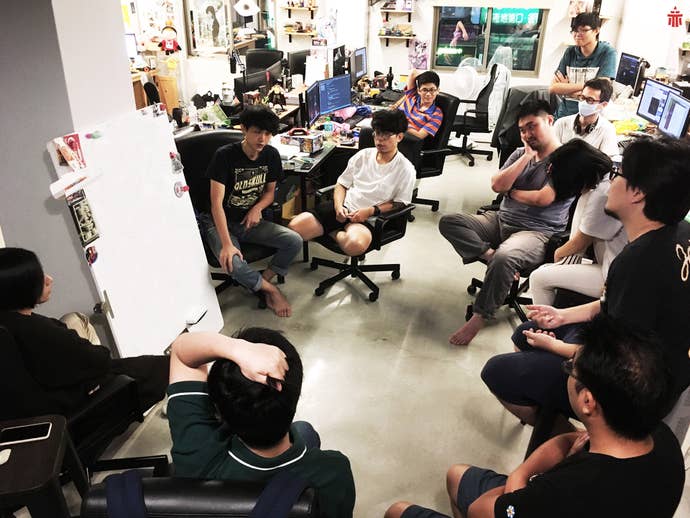
Certain religious rites, such as the burning of joss paper and incense in Detention, are also difficult to explain to players who aren't familiar with them. Rather than letting players carry out this complex ritual themselves, the developers decided to redesign and simplify the entire process by weaving it within the game's dialogue.
At the very least, things seem to be looking up for the studio in recent months. Both Devotion and Detention were added to the prestigious Harvard-Yenching Library's Chinese collection in February 2020, where they will be preserved for generations to come. The library is devoted to archiving significant Chinese-language modern and traditional literary works, with a focus on the humanities and social sciences.
"This is certainly a pleasant surprise to us. When we first received the email from Harvard-Yenching, we once thought that it might be an internet scam," Chiang says. "Therefore when Harvard-Yenching Library archive our works, we were overwhelmed and felt extremely honored. Meanwhile, we felt that it's an opportunity to let people know that gaming is not merely a form of entertainment but can also be viewed as a cultural property, and even recognized by academics."
A few months ago, Detention's film adaptation released, with the movie eventually garnering 12 award nominations at the 56th Golden Horse Awards—the Chinese equivalent of the Academy Awards. This greatly boosted the visibility of the game, which was released on Apple and Android platforms around the same period.
The shifting corridors and ghastly apparitions of Devotion may no longer be accessible to many players now, but Red Candle Games remains undeterred in its vision: to tirelessly make games that will consistently push the envelope. "We are now a group of 14 creators, the vision is to provide a comfortable ground for each one of us to freely express their creativity. There may not be a specific direction we're going with our stories, but we want to make sure the story is [one that's] worth sharing for our audience," says Chiang.
Yet the million dollar question still remains: will Devotion ever be launched again? The studio is fully aware that this is the one lingering question that has been on everyone's lips. "We really appreciate all the acknowledgement and critical praise for Devotion. While currently we are focusing on a new project, If the condition permits in the future, we would like to re-release Devotion again," says Liu.
What resonated with me was the sheer conviction the team's carried when it comes to their creations. Even though their responses felt carefully calibrated—and for obvious reasons, given the maelstrom of controversy they just weathered through—their words were still punctuated with quiet determination. When asked about the message the studio wants to convey through their games, Yang brings up Detention, holding fast to the game's original intent.
"Though Detention is a game filled with Taiwanese and cultural elements, the core message we wanted to deliver is rather universal," Yang says. "That freedom of expression should be granted to all as basic human rights, regardless of one's ethnicity, cultural background or nationality. And we hope that with this universal message, Detention could communicate with its players."
